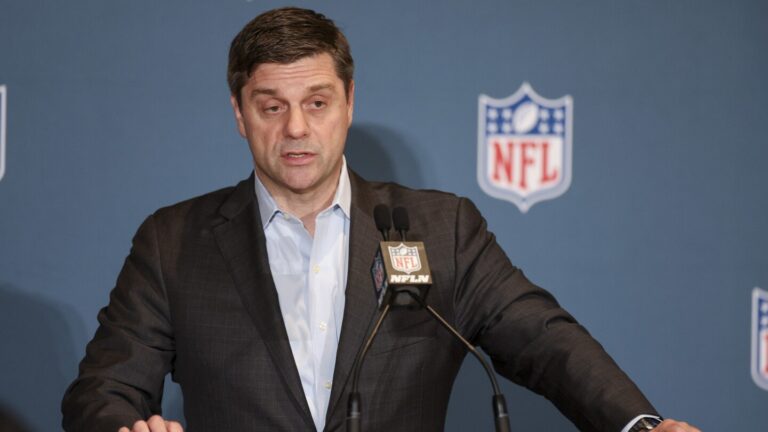I’ve read up to page 1,154 of the Sunday Ticket court transcript, with 1,352 pages still to go.
Much of the trial’s sixth day was dominated by live testimony from Brian Rolapp, the NFL’s chief media and business officer.
The lawsuit focuses on whether the NFL, acting as an 32 independent company, set the price of its Sunday Ticket unfairly high, so expensive that a majority of fans wanting to watch out-of-market games would be satisfied with the “free” CBS and Fox games offered in their local markets. To that end, the plaintiffs have sought to prove that the NFL effectively set the prices of DirecTV’s Sunday Ticket packages, but the NFL argues that this was not the case.
Much of Rolapp’s testimony felt like a cliche from Abbott and Costello: While denying that the NFL sets prices, he acknowledged that the NFL wants to charge a premium and be a complementary product.
Rolapp was also asked about ESPN’s desire to offer the full Sunday Ticket package for just $70, as well as single-team options, and Rolapp acknowledged that the NFL didn’t like that, so they didn’t bring the Sunday Ticket package to Disney.
“We felt that the $70 and the teams and the overall product and service they were offering to the consumer just wasn’t right for a Sunday afternoon,” Rolapp said. “So when you put all of that together, it just didn’t feel right. That’s one of the main reasons we didn’t choose Disney.”
Testimony established that while the NFL isn’t saying it sets the prices, it does have a strong influence over them, so the Sunday Ticket packages won’t dilute viewership for CBS and Fox games in each market.
This is party line, and it’s hard to repeat it all the time. To that point, Rolapp was cited in a podcast interview with Andrew Marchand and John Orlando, in which he said the NFL had no control over the price of the Sunday Ticket at all. Instead, Rolapp said, “Technically, we’re not the ones who set the price.”
Technically, no, it’s not. As a practical matter, it is.
That’s clear from the testimony: 32 independent NFL companies worked together to set the price of Sunday Ticket so high that most people couldn’t afford it. That was an antitrust violation, and that was proven very clearly.

